
This post may contain affiliate links. Click here to find out more about this.
Table of Contents
Generating a high-ticket lead is a brutal process. You know, the leads and potential clients that could skyrocket your monthly growth and even your yearly revenue stream. Not only are they hard to reach, but typical inbound processes often fail. But it’s incredibly saturated. Learn Optimizing High-Ticket B2B Leads with Quora.

Millions of blog posts are published daily. Getting noticed is becoming a task that seems insurmountable. Lead magnets typically only work when you’ve attracted visitors using your blog, too.
But the truth is, you don’t need to focus only on your blog when it comes to specific high-ticket leads in the B2B space.
It’s a great piece of your overall strategy, but it shouldn’t be the main focus when trying to land better clients.
That’s where Quora comes into play.
Quora is possibly the best site to establish yourself as a topic and content expert around.
And we all know that brand bias and credibility play a massive role in sales.
Want to land better, high-ticket clients? Here’s what you need for maximum growth. See Optimizing High-Ticket B2B Leads with Quora.
Optimizing and Generating High-Ticket B2B Leads with Quora
So, what exactly is Quora? It’s essentially a public/social site based on questions and answers.
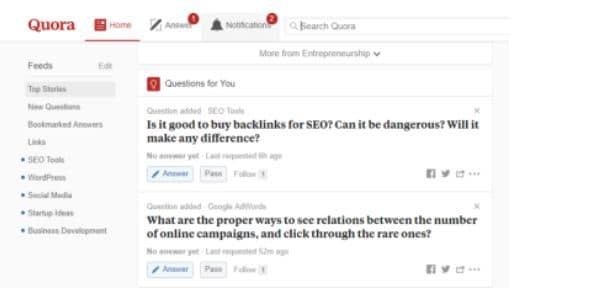
For just about any topic, niche, or subject you can think of, you’ll find questions and answers to those questions on Quora.
Subscribe to our monthly newsletter filled with good stuff
Your data are safe with us. We will never spam and you can always unsubscribe with 1 click.
You likely have even seen Quora links in your Google search results from time to time.
For example, let’s say you wanted to learn more about specific topics you couldn’t find on a standard Google search.
You’d fire up Quora, create an account, and ask any question you can think of:
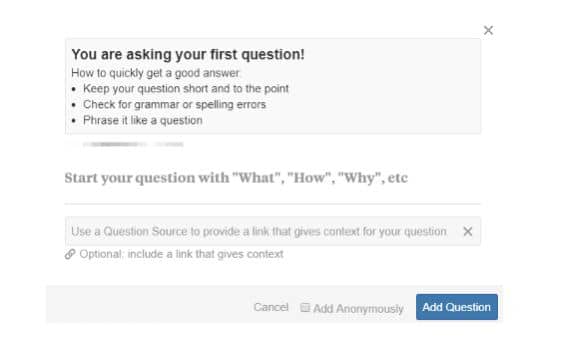
Within a few days, or even hours and minutes, you can expect answers from active users looking to field your questions.
It’s safe to say that the site has taken off since its inception in June 2009.
Quora ranks at spot 149 on Amazon Alexa’s list of the top 500 websites worldwide.
According to the Quora Founder and CEO Adam D’Angelo, the site is top-rated and currently has 200 million unique visitors every month.
And according to some expert digging by long-time Quora fanatics, the user base is estimated to be over 200 million as of 2016:

That’s a massive and active user base of knowledge-hungry and filled users.
Quora is one of the best places to find information and informative content online.
In the world of saturated blogging, it’s hard to find reputable answers that you trust.
With Quora, users can “Upvote” answers that are given to each question:

This feature is one of the crowning jewels of Quora. It helps to distinguish your content from other answers.
By getting direct answers from leading topic experts with tons of upvotes, you can be sure that users have tested their information and given it a high rating depending on its accuracy and efficacy.
In short, it’s social proof that works to prove the worth of your content and knowledge.
It’s extremely effective at building brand awareness for your personal brand or company in general.
It’s an amazing platform to establish yourself as a topic expert and a thought leader in your niche.
By helping people with burning pain points and questions in your niche, you show that you are willing to give free advice and content. And nothing is more valuable than that.
Countless entrepreneurs use Quora to brand and drive traffic back to their sites.
For example, Gary Vaynerchuk takes full advantage of the platform, using it to drive thousands of answer views every month:

By talking and posting on topics that matter to him, he drives, even more, brand awareness and credibility to his name while also driving referral traffic through his links on the platform:
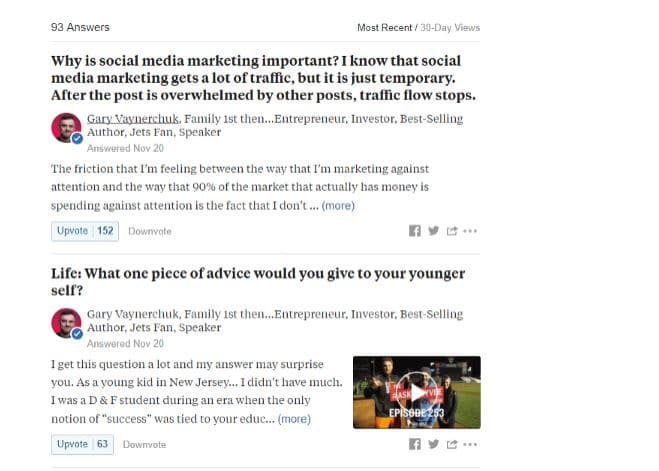
Guy Kawasaki takes the same strategy, leveraging the site to talk about topics that he is engaged with daily:
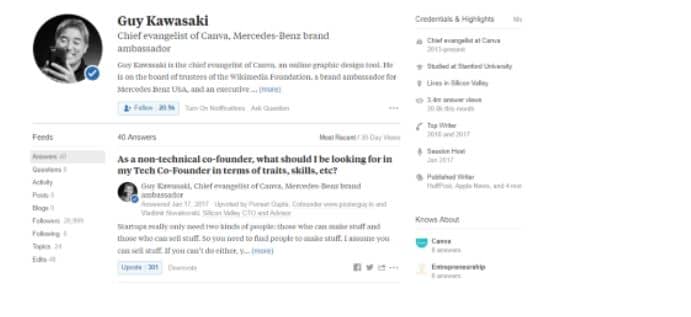
Countless famous entrepreneurs and top brands are using Quora for one reason:
To drive more brand awareness, recognition and to ultimately secure more leads.
Start to take advantage of Quora for better B2B leads.
1. Optimize your profile for business
Quora is a great place to showcase your worth. In fact, it’s critical to showcase social proof if you want Quora to help you generate high-ticket B2B leads.
The reason is the social proof still matters in today’s crowded, saturated online landscape.
A 2017 study on consumer reviews by BrightLocal found that 85% of people trust reviews for a product as much as a personal recommendation.
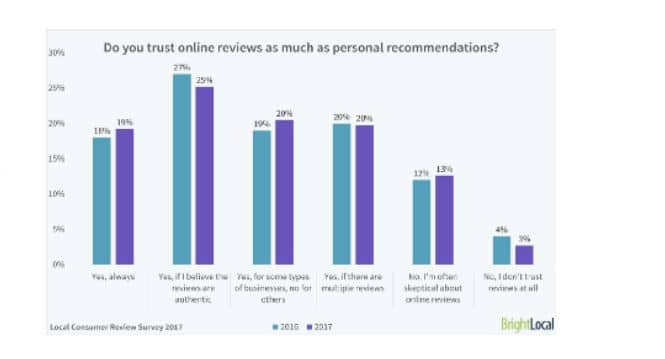
That’s up from 84% in 2016, meaning reviews are still a growing source of education and trust for consumers today.
It only makes sense that you have to showcase your social proof on Quora if you hope to use it for sales.
Social proof helps you build credibility by showing that your tactics or methods have succeeded in the past.
This will help build trust between you and Quora users and increase the number of upvotes you get on your answers.
And more upvotes lead to higher answer positioning and more traffic.
To get started, you want to deck your profile out with any form of social proof you can think of.
Here are a few key social proof points to include in your profile:
- Any credentials or accolades you have achieved.
- Any popular places you have been published or mentioned on.
- Information about your company and your role within the company.
- Always display topics that you are knowledgeable about.
You can include a short yet informative blurb of information regarding background, knowledge, and qualifications that can help you use social proof to earn credibility and trust:
With your description on your profile, you have tons of room to work.
Don’t overdo the description and turn it into a long-form post, though. Please keep it simple and to the point.
Explain to people what you do. What’s your niche? What exactly do you do?
Use the profile description section to showcase both social proof and credibility with your current work specialty.
We recommend linking out directly at the end of your profile description.
The link is UTM-tagged to measure traffic in Google Analytics accurately and links directly back to the About page on your website:
On the “About page” link, you can continue to showcase your skills, story, and even more social proof in the form of numbers.
Beyond your profile description, you should also optimize the short description under your full name.
The short sentence of information is critical for your personal branding and trust levels on Quora.
When a user posts a question on Quora, answers can start to flood in fast.
Some questions get hundreds — if not thousands — of answers from thousands of unique people:
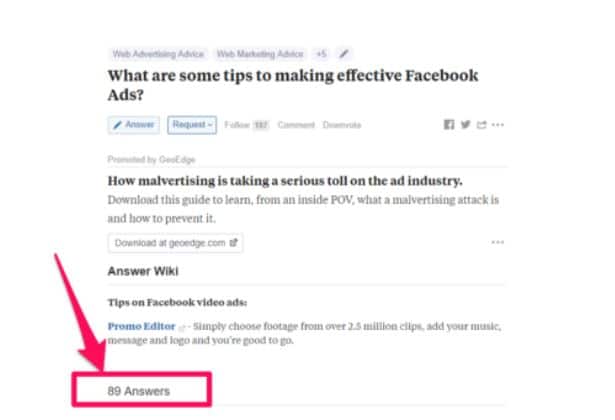
This post was published and already has 89 responses.
The key to your one-sentence headline description is to build credibility behind your responses.
For example, when a user looks at the answers to their question, they will see your name, picture, and the subheader:
If you were not to display that line showing credibility, people might not take me seriously.
They might not trust my answers to give them the results they need, likely causing them to move on to the next answer.
For this line, create something short and sweet. Have you worked in your niche for a long period of time? Use that as experience.
In just a few words, you should be able to explain why people should take your advice.
And as always, use a real picture of yourself.
In your credentials section, treat it like you would a high-value resume or your LinkedIn profile page.
List out your experience at different companies or within your own business and any more accolades you have accumulated in your niche.
The more experience you display, the better.
Ultimately, your profile is a huge selling point on Quora. If you want to land the best clients in the B2B space, you have to communicate that you are the best around.
Now it’s time for the fun part. Check Optimizing High-Ticket B2B Leads with Quora.
2. Start answering questions in your niche
Once you have built your profile into a powerhouse resume, it’s time to bring attention to it in the best way possible.
With Quora, you can browse topics, sections, niches and craft specific answers to any question.
The first step is to start following specific topics that you are experienced in.
The best Quora strategies for high-ticket B2B leads to focus only on the content you know and work with.
You can’t try to fudge it on Quora. You have to know what you are talking about to land leads.
If you answer questions with a simple paragraph of random information, people won’t visit your site.
To get started, log in to your Quora account and head to the homepage.
From here, you should see a sidebar called “Feeds.” This feed section shows you all of the new content relating to the topics you follow.
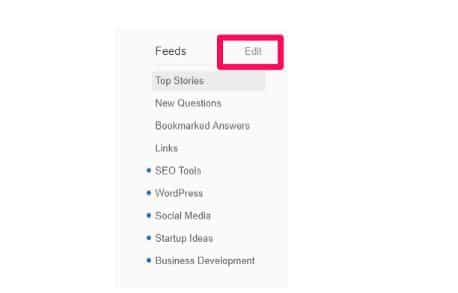
Click “Edit,” and you can change the content you see in your feed, following or unfollowing topics depending on what you want to see and respond to.
To add more topics to your bookmark, search for them, and click on them to directly add them to your list:
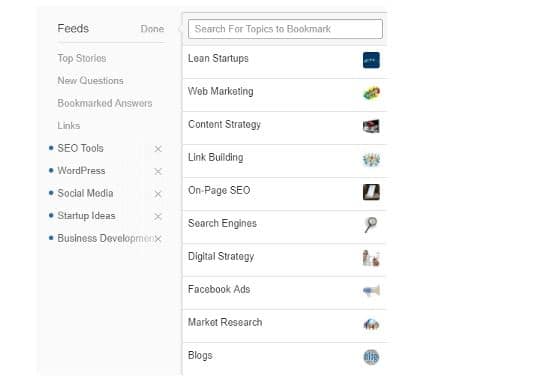
Instantly you should see questions populating your feed in regards to the new topics you added.
Another way to add more topics is within your profile, under the “Knows About” section:
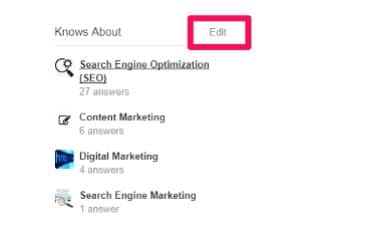
If you edit these topics, they will also show up directly on your profile and are a great way to showcase your depth of knowledge on different subjects.
Edit the topics, add more to see content from them, and show potential to know many different topics.
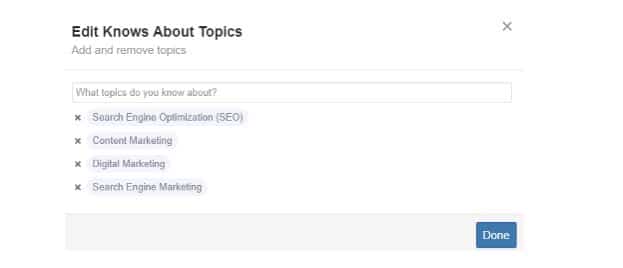
Once you’ve done this, you can start to answer questions and drive those users back to your site.
You can do this on Quora to generate big leads for my business.
The trick is this: To treat each answer to Quora’s question like a long-form blog post.
For example, if someone asks about tips for making Facebook Ads more effective, you can easily turn that into a blog post.
And the beauty of following topics only in your niche is that you likely know the answers without having to do much research.
You might have even blogged about those topics before, allowing you to repurpose that content for a Quora answer.
This is the key strategy for naturally bringing traffic to your site without getting penalized for spamming.
Search for topics on Quora that don’t have many answers. Look for topics you have written about on your own blog that you can quickly repurpose.
Doing this will limit the number of answers you can post since not all topics will be familiar.
But this will take much less time, too.
Towards the end of your post, always link out back to your website:
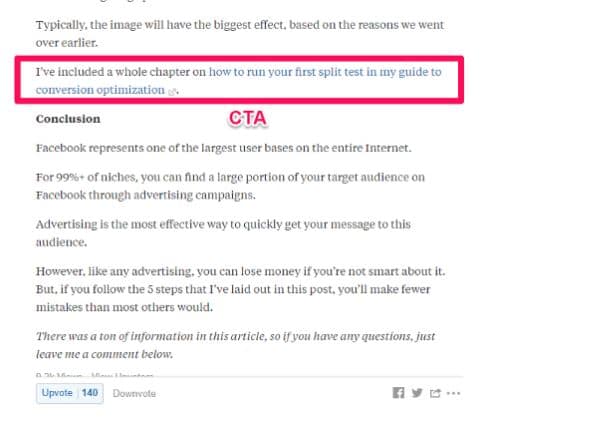
Using a specific call to action that provides value brings engaged readers back to your site to convert them into leads.
At the very end of each post, always encourage engagement:
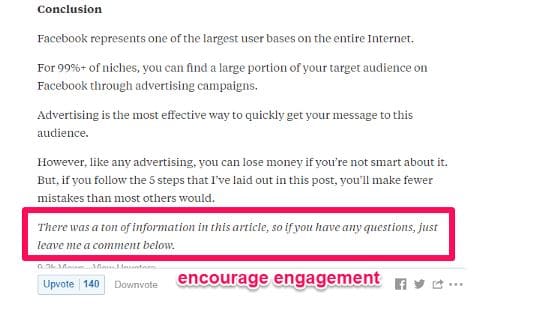
Encourage users to ask questions, leave comments, and upvote your answer if they found it helpful.
Upvotes can help your answers get seen by more users, giving you more chances to capture site traffic.
As you start to build engagement and traffic on your Quora content, consider creating a blog from your profile:
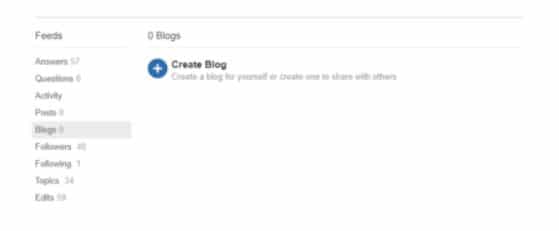
Doing so can help you communicate more value and dedication to the platform than just appearing hungry for leads and sales.
As traction builds on your marketing strategy, it’s time to turn these Quora visits from simple traffic numbers into your high-ticket wins.
Here’s how.
3. Remarket your Quora traffic to close sales.
Bringing in traffic from Quora is just the first step.
It can help you land tons of high-quality B2B leads. But they won’t convert immediately.
Your job is to turn them from simple leads that enjoy your content to clients that stick with you for the next five to ten years.
And then clients that bring your monthly and yearly revenue up 10x.
You can do it by creating remarketing lists and ads that you can use to seal the deal.
According to the latest data, 98% of people won’t buy from you on the first visit, let alone give you information.
That means you can only expect to land 2% of Quora traffic into your funnel without using ads or lead-magnet offers to get their information.
To combat this, you’ll need to run at least a few sets of remarketing ads to capture their emails.
Once you’ve done that, you can send them email campaigns for free.
But the hard part comes with getting their attention using remarketing.
For this method, you can use AdWords and Facebook, but we recommend using Facebook for the most part.
The audience targeting is precise, along with the amount of customization you can do with custom audiences.
To get started, you’ll want to create a new custom audience in the “Audiences” section of your Facebook Business Manager:
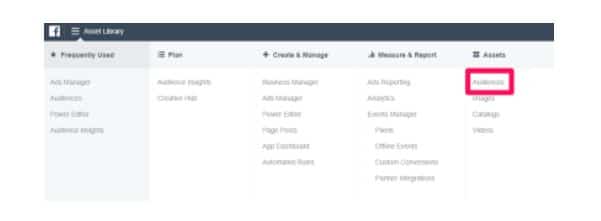
From here, create a new custom audience based on website traffic:
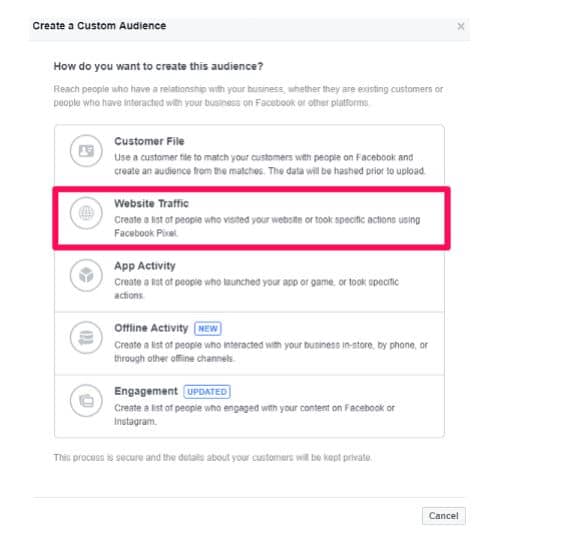
Since you target website traffic, you will need to use crafty work to target the right traffic.
The best way to ensure that you only target Quora’s traffic is by using UTM parameters in your links.
Using the Google UTM builder, you can create dynamic links for each link you post on Quora answers:
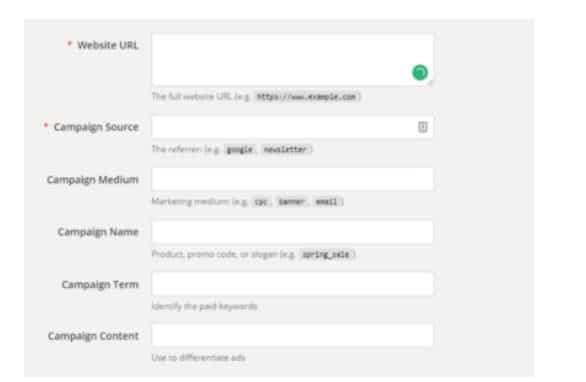
Each time you post a new piece of content on Quora. Whether it’s to your Quora blog, an answer, or your profile, ensure that every single link is tagged with UTMs.
First, enter the link URL, and then tag the campaign source as Quora. If you want to target any other features, you can do that too (but they’re optional).

For example, check out the link currently used in the About section of my Quora profile.
It’s tagged with UTM codes to ensure that Google Analytics marks Quora’s traffic instead of just a direct link click.
This way, when you create your ads, you can remarket users based on URL visits, ensuring that utm_campaign=quora is within that specific parameter.
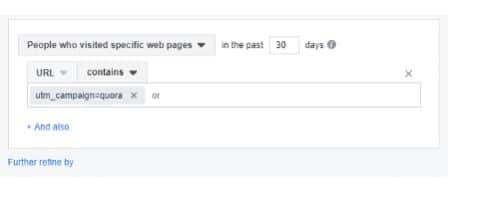
All links tagged on Quora with your UTM will be captured by the Facebook Pixel into a remarketing list with this parameter.
But you can be confident knowing that you are advertising to Quora traffic instead of paying for other clicks outside of your Quora strategy.
Well, consider what stage of the buyer’s journey these leads are likely in:

For the most part, traffic will likely be in between awareness and consideration.
They have heard of you on Quora by reading your profile or answers. They don’t really know what you offer in terms of services or products just yet.
Meaning they aren’t unaware of your brand. They are not yet considering your product because they don’t know about it.
To answer their needs effectively, your content should focus on offering value and educating them on your offering.
For example, you can do this all the time using Facebook Ads for webinar-style content:
This works to provide value in a free webinar and show my expertise in attracting and converting prospects.
It’s a dual-edged sword of a lead magnet to give you the highest chance of converting these high-ticket B2B leads.
Try running a few of these campaigns regularly to turn more of your Quora traffic into high-quality leads and sales.
Conclusion
The process of generating normal leads is already tough, let alone high-ticket leads in the B2B space. The leads you need to grow a business from thousands to millions in revenue are hard to come by.
Subscribe to our monthly newsletter filled with good stuff
Your data are safe with us. We will never spam and you can always unsubscribe with 1 click.
Using Quora, a site with over 200 million active users, you can display unprecedented amounts of brand strength, knowledge, and credibility.
It’s perhaps the best platform to showcase trust and land clients. You can showcase your experience in the form of useful, actionable answers to real industry questions.
It also shows that you’re dynamic enough to answer questions on the fly.
To generate high-ticket leads with Quora in the B2B space, start by optimizing your profile. Show accolades and achievements, or leverage testimonials and social proof to build your profile.
Next, start to follow, engage, and answer questions in your niche.
Just follow common topics you’ve written about before and use your blog as supplementary info to drive traffic and easily answer questions.
Start a blog on your own Quora profile to provide new content for users that examine your profile.
Using lead magnets and CTAs, you can lure Quora users back to your site, where you can remarket them and turn them from high-quality leads to lifelong clients.
Quora is waiting for you, and now is the time to get started. Optimizing High-Ticket B2B Leads with Quora.





